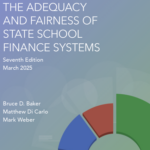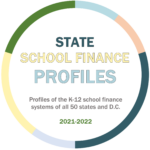Visualization: district spending adequacy profiles
This tool allows users to display and visualize K-12 spending adequacy for over 12,000 individual U.S. school districts in each year between 2009 and 2022 (estimates updated annually on a 2-3 year lag due to federal finance data release schedule). Choose a district by selecting a state, district, and year, and then pressing the “apply” button. The visualization is separated into four tabs (click on a tab in the visualization to display):
- Spending adequacy: compare actual spending per-pupil in the selected district/year with the spending level required (i.e., adequate) to achieve national average test scores.
- Adequacy/outcomes: compare adequacy with the average testing outcomes in the selected district/year.
- Trends: examine the trend in the selected district’s funding adequacy (expressed in $ gaps) between 2009-21.
- Characteristics: display contextual district data, including Census poverty and student race/ethnicity.
Users should be cautious about interpreting the estimates of required/adequate spending for a given district as the “correct” amount. This is not only because our cost model relies on (inevitably) imperfect finance and outcome data—and it cannot control for everything even with perfect data—but more importantly because our adequate/required spending estimates are based on a student outcome benchmark (spending adequate to achieve national average test scores in math and reading) that is very modest. States choose their own outcome goals, and (hopefully) calibrate their funding to achieve those goals. The best ways to interpret our adequacy estimates for a given district include (but are not limited to): 1) comparing them with districts in the same state (the bar graphs at the bottom of the “Spending Adequacy” tab); 2) viewing the trends for a district over time (“Trends” tab); and 3) checking the relationship between adequacy and testing outcomes (“Adequacy/Outcomes” tab).
All of the data in the visualization are from our District Cost Database (DCD). For more information about these measures, see the DCD user’s guide or check out this research brief. You can also download the full dataset.
Note: if you get an “unexpected error” message when attempting to load the Tableau visualization, try enabling third party cookies in your web browser.
Latest News
 UPDATED ANNUAL REPORT, PROFILES, AND DATASETS AVAILABLE
UPDATED ANNUAL REPORT, PROFILES, AND DATASETS AVAILABLE
March 2025: Read the seventh edition of our annual report, view your state’s one-page finance profile, use our data visualizations, or download the full state- and district-level dataset.
Latest Annual Report
 The Adequacy and Fairness of State School Finance Systems (7th edition)
The Adequacy and Fairness of State School Finance Systems (7th edition)
The seventh edition of our annual report presenting findings on effort, statewide adequacy, and equal opportunity in state school finance systems. Published March 2025.
Latest Research Briefs
 State School Finance System Profiles (2021-22 school year)
State School Finance System Profiles (2021-22 school year)
One-page profiles summarizing the key results on effort, statewide adequacy, and equal opportunity for all 50 states and D.C. View your state’s profile. Published March 2025.




